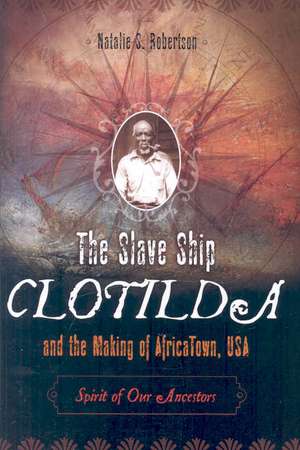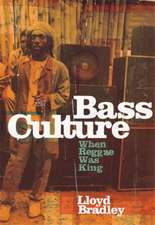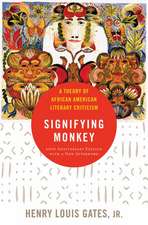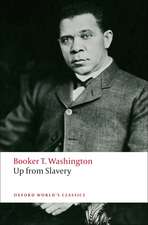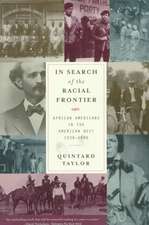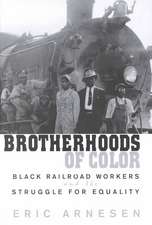The Slave Ship Clotilda and the Making of AfricaTown, USA: Spirit of Our Ancestors
Autor Natalie S. Robertsonen Limba Engleză Hardback – 29 mar 2008 – vârsta până la 17 ani
Preț: 310.50 lei
Preț vechi: 376.37 lei
-18% Nou
Puncte Express: 466
Preț estimativ în valută:
59.42€ • 63.53$ • 49.54£
59.42€ • 63.53$ • 49.54£
Carte tipărită la comandă
Livrare economică 17 aprilie-01 mai
Preluare comenzi: 021 569.72.76
Specificații
ISBN-13: 9780275994914
ISBN-10: 0275994910
Pagini: 272
Dimensiuni: 156 x 235 x 26 mm
Greutate: 0.62 kg
Editura: Bloomsbury Publishing
Colecția Praeger
Locul publicării:New York, United States
ISBN-10: 0275994910
Pagini: 272
Dimensiuni: 156 x 235 x 26 mm
Greutate: 0.62 kg
Editura: Bloomsbury Publishing
Colecția Praeger
Locul publicării:New York, United States
Notă biografică
Natalie S. Robertson teaches at Hampton University and is the editor of African American History in Transatlantic Perspective (2002) and The Ancient and Global Dimensions of Black History (2000).
Cuprins
DedicationAcknowledgmentsChapter One Prelude to PerilChapter Two Voyage of the Slaver ClotildaChapter Three The Dahomean DimensionChapter Four Atlantic PassageChapter Five In the Jaws of the LionChapter Six Central NigeriaChapter Seven The Founding of AfricaTownChapter Eight Spirit of Our AncestorsChapter Nine Cross-RoadsBibliography
Recenzii
After 15 years of research, from Benin to Alabama, historian Robertson offers a detailed reconstruction of the illegal voyage of the Clotilda and the amazing effort of the Africans to re-create lives for themselves in a strange land, as well as the traditions and cultures of the land they left behind. Robertson talked to Africans on both sides of the Atlantic to explore the complexities of the slave trade and continued cultural connections. She includes photographs of the descendants in America and Africa and the ties they continue to share..[T]his book will also appeal to readers interested in how black Americans have retained African culture.
.[A] superbly researched ethnographic monograph of the African origins and the fortitude of survival in slave society Alabama of 75 captives, who in 1860 were illegally transported across the Atlantic Ocean in defiance of federal laws against trafficking human cargo. She engages the reader in more than just the on-board, inhumane conditions that confronted the human cargo it transported. Through diligent, scholarly retrieval of the ethnographic and cultural data in Nigeria, combined with interviews of the captives in the early part of the last century, the book tells the story of who the 75 individuals were in terms of African origins, as well as how their indomitable African spirit of resiliency sustained them through the short period of enslavement and the eventual founding of AfricaTown in Mobile, Alabama. This book is recommended for readers at the college and high school levels as well as the general reading public.
. Robertson draws on African fieldwork and almost 50 interviews 'to metaphysically connect' the 'Clotilda's' captives to their West African cultures. Robertson concludes that the Clotilda captives originally were enslaved in separate raids and derived from many Yoruba cultures. She credits the 'Clotilda' descendants with resiliency, self-help, and survival based on their West African traditions.
There are a number of fine historical examinations of Africans in the diaspora, but few offer an approach as interesting as Natalie S. Robertson's study of the persistence of African culture among slaves in AfricaTown, Alabama. The Slave Ship Clotilda is at once historical scholarship and a journey of self-discovery. At its core is Robertson's use of oral history and archival research to trace the development of one community as its members confronted the challenges of being African in nineteenth-century America.
Robertson skillfully traces individual survivors back to specific geographic regions and makes plausible arguments as to where they likely came from based on admittedly tenuous evidence.
.the information provided expands our knowledge about African cultural values, attitudes, and naming practices.the study contains a good deal of useful and original data.
.[A] superbly researched ethnographic monograph of the African origins and the fortitude of survival in slave society Alabama of 75 captives, who in 1860 were illegally transported across the Atlantic Ocean in defiance of federal laws against trafficking human cargo. She engages the reader in more than just the on-board, inhumane conditions that confronted the human cargo it transported. Through diligent, scholarly retrieval of the ethnographic and cultural data in Nigeria, combined with interviews of the captives in the early part of the last century, the book tells the story of who the 75 individuals were in terms of African origins, as well as how their indomitable African spirit of resiliency sustained them through the short period of enslavement and the eventual founding of AfricaTown in Mobile, Alabama. This book is recommended for readers at the college and high school levels as well as the general reading public.
. Robertson draws on African fieldwork and almost 50 interviews 'to metaphysically connect' the 'Clotilda's' captives to their West African cultures. Robertson concludes that the Clotilda captives originally were enslaved in separate raids and derived from many Yoruba cultures. She credits the 'Clotilda' descendants with resiliency, self-help, and survival based on their West African traditions.
There are a number of fine historical examinations of Africans in the diaspora, but few offer an approach as interesting as Natalie S. Robertson's study of the persistence of African culture among slaves in AfricaTown, Alabama. The Slave Ship Clotilda is at once historical scholarship and a journey of self-discovery. At its core is Robertson's use of oral history and archival research to trace the development of one community as its members confronted the challenges of being African in nineteenth-century America.
Robertson skillfully traces individual survivors back to specific geographic regions and makes plausible arguments as to where they likely came from based on admittedly tenuous evidence.
.the information provided expands our knowledge about African cultural values, attitudes, and naming practices.the study contains a good deal of useful and original data.
